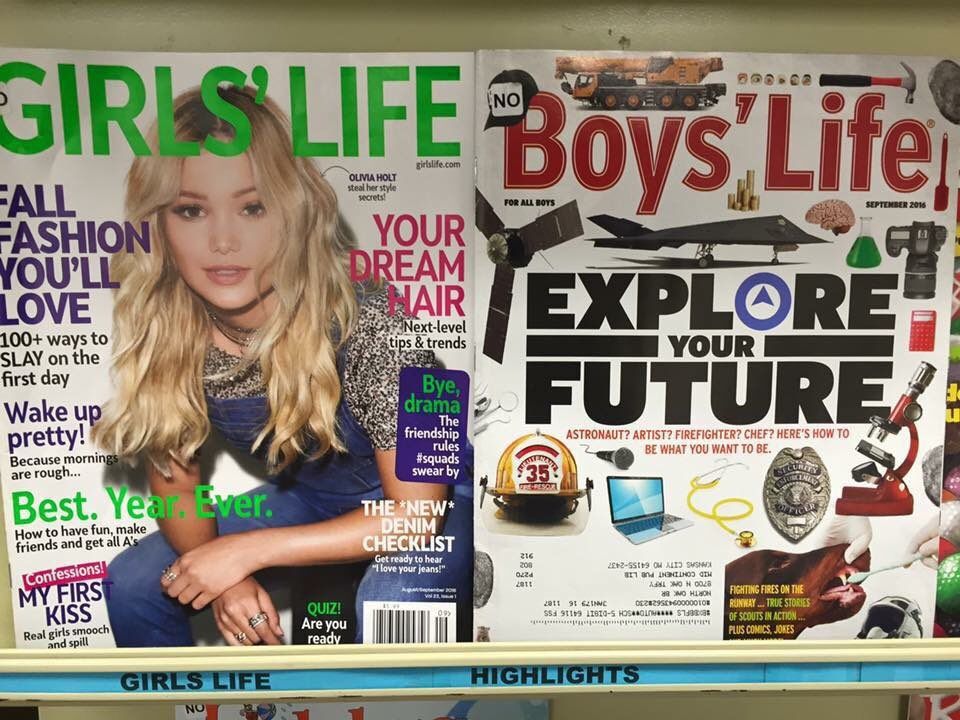There is a stark contrast between the cover stories in current issue of Boys’ Life –vs- Girls’ Life. [see it here]. The Boys cover effectively urges males to learn, build, think and question assumptions. But, the Girls cover wonders “Oh My! What will you do with your hair and nails today!”
Although I am a feminist—and readily jarred by the juxtaposition of contrary messages—I am giving editors at Girls’ Life a ‘get out of jail’ pass this time. It may not be the sexism that it seems.
[Originally published at AWildDuck under my pen name, “Ellery”]
Jennifer Wright (@JenAshleyWright) kicked up a firestorm last week, when she tweeted a photo of two side-by-side magazines on a newsstand. The contrast between cover features of Boy’s Life –vs- Girl’s Life is startling. With characteristic sarcastic wit, she tweeted:
“Why are you feminists always complaining?
We treat boys and girls exactly the same.”
For those who are reading without the above image, the current issue of these magazines calls out to readers like this:
- Boys: Would you like to build and fly the next generation of jet fighters?
- Girls: What on Earth can you do with your hair and nails this weekend?
The difference between these covers suggests that the respective magazine editors are pushing 19th century aspirations onto the next generation of 21st century women. It’s a reminder of lingering differences in the way we perceive the sexes. But does this contrast present a fair and balanced comparison?
Certainly, there is work to do—but, the stark difference between these magazine covers may not point to a societal ill in the way that seems to jump off the screen.
- Despite similar titles, these magazines have very different audiences and goals. I doubt that Girls’ Life is aimed at the broader demographics of Boys’ Life. The subscriber base evolved to target the girls of Toddlers and Tiaras. I am exaggerating by pointing to a narrow demographic, of course! but it sells to girls who already aspire to be future homemakers, or who simply have the fashion obsession that is still the hallmark of many preteen girls.
- Unlike boys, girls really do have more options for viewing their future and their careers. Feminism and technological/political empowerment is not yet universal or even universally embraced. Some families, particularly among the south, among religious conservatives, and among hard-hat towns dependent upon muscles and mining, still promote the notion of TFRs onto the next generation (traditionally female roles). Right or wrong, it brings us to point #3…
- It’s clear that there is a stark difference between covers: “How can I build a jet fighter?” –vs- “What will I do with my hair tonight?” But, it is all too easy to assume that we understand cause-and-effect. That is, the difference is likely to be a reaction to market forces, rather than the publisher’s attempt to shape desires. One cannot find fault with delivering content based on consumer demand.
If you tell me that there are plenty of girls that hope to build or fly a jet fighter, I will nod in violent agreement. But if you tell me that there is an equal fraction of boys who obsess over their nails, hair and the color of a blouse, I will wonder if we live on the same planet.
My teenage daughter is clearly in the former group: She imagines, asks tough questions, builds, tears down, and then builds a better gizmo from scratch. She codes Android apps and creates massive murals for the local shopping mall. But, some girls care about classic ‘girly’ things, at least during their early years. And here’s a surprise…
Many of these gilrly girls exhibit just as much technical proficiency and self-confidence as their empowered peers. They are assertive, independent, financially savvy, and aware of their equal political and career footings.  Yet, many of us feminists bristle at the thought of a female child who obsesses about their hair and nails (at least to the point of subscribing to a magazine in that venue). In fact, the two are not mutually exclusive.
Yet, many of us feminists bristle at the thought of a female child who obsesses about their hair and nails (at least to the point of subscribing to a magazine in that venue). In fact, the two are not mutually exclusive.
So, can I still call myself a feminist in the mold of Betty Friedan or Gloria Steinem? Perhaps not. I am more likely to identify with a less militant Helen Gurley Brown. She was all about empowerment and sexual equality. Yet, somehow, she avoided pushing the sexes to be completely indistinguishable and androgynous.
Do you disagree? Do you think that I exhibit a Luddite attitude that is at the core of a chauvinistic society? Don’t just let it grate on you—Be a Wild Duck! Leave a comment here, next to the original article.
Philip Raymond
Boston MA
